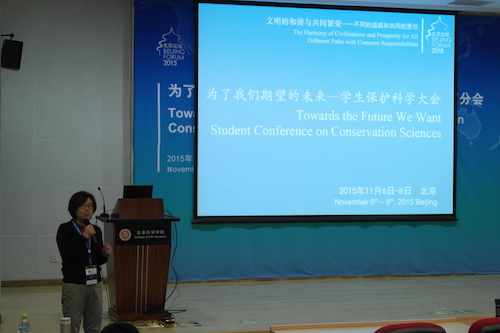On the afternoon of November 6, 2015, the third Student Conference on Conservation Science—Beijing (SCCS Beijing) was held at the Life Sciences Building of Peking University (PKU) as part of the student panel of the Beijing Forum.
The first SCCS was first held at Cambridge University in 2000. Since then, it has developed four parallel venues in Bangalore (India), New York (U.S.), Brisbane (Australia), and Beijing (China). Continuing to be part of Beijing Forum 2015, this year’s SCCS Beijing has the theme of “Towards the Future We Want”, which focuses on conservation biology and is part of the larger “The Harmony of Civilizations and Prosperity for All” theme of the Beijing Forum.
Afterwards, participants gathered at the hall of Life Sciences Building where their posters exhibiting research advances were on display. Professor Lu Zhi, a renowned conservation biologist, deputy director of the PKU Center of Nature and Society, gave opening remarks for the conference, and she warmly welcomed all the guests and introduced the first speaker, Professor Wang Ding.

Professor Wang works for the Institute of Hydrobiology of the Chinese Academy of Sciences. He is also Secretary General of the Chinese National Committee for Man and Biosphere, UNESCO. As a scientist who has been devoted to the conservation of freshwater dolphins for decades, he told stories of two species in Yangtze River and explained how human activities have threatened the river ecosystem. In 2006, Professor Wang participated in a wide-range survey on the Yangtze River, which later resulted in the announcement of the functional extinction of Baiji, an endemic freshwater dolphin in Yangtze. It was the first cetacean species to go extinct because of human activities and also the first vertebrate to go extinct in fifty years. Following its extinction, the Yangtze finless porpoise remains in the Yangtze but is now critically endangered. With the porpoises highly affected by all kinds of human activities, like shipping, construction, and fishing, the Yangtze River has witnessed the rapid decline of its population and even more seriously, the fragmentation of its habitat. After introducing current conservation efforts, Professor Wang ended his talk with a famous quotation “All things are connected. Whatever befalls the earth befalls the children of the earth.”

Later in the afternoon, students from different continents shared their works in conservation of various ecosystems. Alan Eduardo de Barros from the Institute of Bioscience, Brazil, the last speaker, explained individual-based movement models that he developed. In the evening, the first training session was held for these young conservation biologists and practitioners.
Written by: Bai Luolan
Edited by: Wei Yuchen



